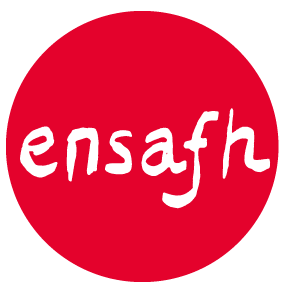
Yn it ramt fan it Kulturele Haadstêd 2018-projekt ‘Poetic Potatoes’ wiene de Malteeske skriuwster Rita Saliba (Pietà, 1964) en Leanne Ellul (Malta, 1989), redakteur fan it Malteeske tydskrift Inizjamed en ek skriuwster, fan 22 oant 25 juny 2016 yn Ljouwert. Ik hold op freedtemoarn de 24e in ynterview mei harren yn Post Plaza. Marc Kooij hat in filmke fan Rita makke.
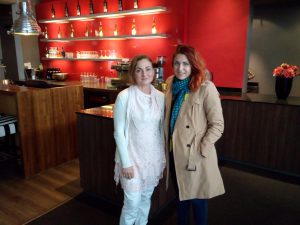
Rita Saliba en Leanne Ellul
What did you do in the past days and what are your plans for the rest of the day?
Leanne: ‘One of the main highlights was the poetry performance related to ‘Poetry in Potato Bags’/’Potatoes go wild’ yesterday evening in Tresoar. This was made possible thanks to Brian Buhagiar and the European Commission Representation in Malta. Rita also did a workshop this morning at a school.’ Rita: ‘We had a workshop with primary school children. They translated a Maltese poem into Dutch. We split them into groups and each group did a strophe. They used the dictionary, which surprised us. Nowadays children search words from the internet, but the actual looking up in the dictionary is encouraging. And then each group said the strophe. There was a boy who wrote the strophes and recited the poem.’ Leanne: ‘Yesterday we were invited at the Leeuwarden 2018 office as well and we spent some time with Jelle (Burggraaff) and we talked about the government of culture. Then we went on a boat trip, which was very nice.’ Rita: ‘This afternoon we are going to the Fryske Akademy, to exchange ideas and to talk about writing. The language issue here is quite similar to ours.’ Leanne: ‘After that we are going to see a museum. Tomorrow morning we are heading back to Malta.’
How are you involved with the organization of Valletta Cultural Capital 2018?
Leanne: ‘I work for the the cultural non-governmental organization Inizjamed and we are collaborating with Valletta 2018 on three particular projects. So I’m working for Valletta 2018 Foundation as well.’ Rita: ‘I am involved with the project ‘Poetry in potato bags’ of Cultural Capital 2018. I did workshops in an activity center for young children on Malta. They meet there during their summer holidays and they do activities. These children are multicultural, so I can do a lot with them to keep them occupied. It was an idea of Nathalie Grima, part of the organization of Valletta 2018. And she invited me to contact the poetry workshop, which involved growing potatoes. The children had no idea about rural environment, because they live in a city and they were enthousiastic about it. I met the potato farmer Michael Caruana, a very young guy. He travels a lot to the Netherlands to be with the farmers here and to buy potato seeds. And then we had a brainstorming session. The ages were a mixture of young ones with early teens, and their input was incredible. Some of them found the rhyming words, others related to the story, the young ones mostly drew how the potato grows, so all were involved. At the end of the workshop we came up together with a poem in Maltese, which was recited in four languages at Tresoar yesterday.’
Lês it gedicht ‘Widzesankjes fan de simmer’ yn fjouwer talen.
How did you get in contact with Janneke Spoelstra?
Rita: ‘In January I was invited by Adrian Grima to a poetry recital in Valletta. There was an exchange of ideas with poets from Friesland, Janneke Spoelstra and Hein Jaap Hilarides. I did some poetry on the rural aspect, traditions and potato growing. I also write prose. It’s more comfortable for me, I can express myself more and more freely, so I also exchanged some prose during the evening. The Frisian poets recited their poems in both Frisian and English, but I never even dared to translate or look at the English text, I just listened to the sound of the language, it’s so interesting. Janneke and Hein Jaap also did a workshop with children at a Maltese school. They read poetry for the children and talked about growing potatoes.’
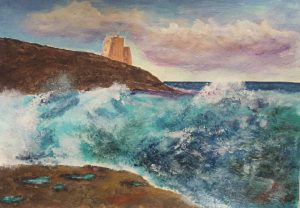
Skilderij Rita Saliba
What kind of work do you do, besides writing?
Rita: ‘I do lots of jobs. I work from home now and it’s mainly writing. I didn’t study at University level, but I did various things. I used to work at a bank, I worked with the elderly, I was a coach and I ran an athletics club together with my husband. I work as a volunteer and I’ve met many people. Writing was always going on as a hobby. I’m also a proofreader, I’m certified for that, and I do some editing as well. And painting. I Paint potatoes, landscapes, seascapes. I love the sea. When I do an abstract I build it up gradually; i take pictures, sketch from different angles, create a composition. Sometimes it’s a mixture of various media. I also make portraits of my friends. When afterwards they still speak to me it is okay, it is a good portrait. But if they don’t talk to me anymore, hmmm.’
Leanne, you are one of the organizers of the Malta Mediterranean Literature Festival. Please tell me more about the festival.
‘Inizjamed is a voluntary non-government cultural organisation whose artistic director is Adrian Grima. He has tutored a lot of us and thus brought forward a new generation of authors. He has been an inspiration to a lot of poets and cultural innovators, so I always turn to him for advice. Inizjamed feeds on the collaborative spirit between the team that works for the Malta Mediterranean Literature Festival, which will be happening between the 25th and the 27th of August. The word ‘Mediterranean’ doesn’t imply that we have only Mediterranean or Maltese poetry. It implies that the Mediterranean is the center where different cultures meet to create dialogue and exchange views, political views sometimes, and about culture and literature obviously. And we have local authors. Rita is one this year’s guest authors. And we have foreign authors that come from different countries and continents too. This year for instance some really good names that we have are Rodolfo Häsler from Cuba/Spain, Marc Nair from Singapore who is a spoken word poet and Elias Khoury, a Lebanese author. What’s also interesting about this festival is the location where it’s held in. Along the years it was held in different places. This year it’s the eleventh year. Two years ago it was the last time that we put up the festival at an old cemetery. And now it is being held at one of our fortifications, at Fort St Elmo.
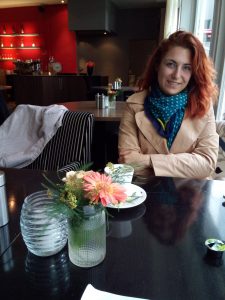
Leanne Ellul
What’s also nice about this festival is that there is a mixture of not only literature in the strict sense of the word. There’s also music and poetry films, which is rather a new genre in Malta, but it’s slowly establishing itself, I must say. We get around 150 visitors each night. Some people attend all three nights, some people come only for one night. Also a good thing about this festival is that the authors are there for one week. Four days before the festival they meet to get to know each other and to translate each other’s work. By the time of the festival there will be really good synergy between them. We’ve had had publications with these translations. And we get more work translated to Maltese. This is something that we are emphasizing, getting Maltese work translated into other languages and getting that work exported. Also the arts council is trying to push that forward and Inizjamed has been working on that for quite some time. So the festival is a combination of all the work that has been going on through the year.’
How long have you been involved with the organization of the festival?
Leanne: ‘I’ve been involved within the cultural sector for five or six years now. With Inizjamed I’ve been directly involved for three or four years. And I’ve just started working with Inizjamed last May.’
How long have you known each other?
Rita: ‘We were together at an evening of the women’s literature in 2010. We got very close because we share each other’s work.’ Leanne: ‘We take part in similar activities. I also write poetry and prose.’
Have you both published books?
Rita: ‘Yes. My first stories were published in text books for school children. And I had children’s books published and teen novels and then I wrote an adult book. I’m working on another book at the time, it’s a collection of short stories. I also translated two teen novels from Italian to Maltese.’ Leanne: ‘I’m working together with Clare Azzopardi on text books for primary schools. I have works in several anthologies and I have a novel for young adults, Gramma. This year I have published a picture book in translation. Another novel in translation will be there by the end of the year. And I’m working on other works.’ Rita: ‘It’s not very easy to get a book published in our country, because it is a small market. You have to be very persistent and very down to earth. The book is not going to sell and is not going to meet much audience, so you need guts to do it. But there’s a shift now. The people are buying more books, especially the young adults. The books are not so expensive anymore, because they are subsidized. The printing in Maltese used to be very expensive, but now we have better machinery and also the marketing is better.’ Leanne: ‘The publisher can apply for some of the funds for publishing books in Maltese.’ Rita: ‘We have a lot of disadvantage, because for example we don’t have many editors. So to edit a book I send it to Leanne or some friend.’ Leanne: ‘We have some really good editors who are authors themselves.’ Rita: ‘Even though they are really really good editors they might influence your writing, so you have to be open minded. You can either accept the comments, or reconsider them. Not that they don’t help, they help you a lot. And when they’re your friends it’s a bit tricky, because they know you so much they anticipate what you’re going to write next time. I prefer objective editors.’ Leanne: ‘Sometimes the publisher takes on the role of the editor and we don’t have agents for instance. Those are unexistent really. Or also the publisher takes on the role of the agent.’
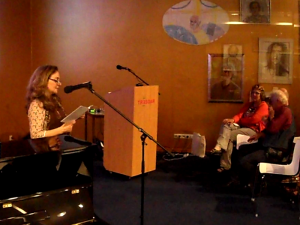
Rita Saliba lêst foar yn Tresoar
Can you make a living of your writing?
Leanne: ‘No. I teach as well. And I’m working at Inizjamed. So I can’t make a living out of it. But obviously there’s a difference between certain publishers. The professional ones give you the royalties and copies of the book. The market the book and organise activities related to it. But when it comes to others, they give you a couple of copies and that’s it sometimes. So there a couple of publishers that are really really professional and others are just in it for the business and that’s it.’ Rita: ‘If you believe in your story and it’s a good book, I would tell them to go for it, don’t look at the money. It will teach you most of the things about life as well, it will help you grow. The publishers are the business men and we are the artists.’ Leanne: ‘A publisher I work closely with, if he tells me it’s not publishable yet, I believe him. I trust his view of the work. It means I still have to work on it or it’s not good enough for the audience I am targeting. So, it is a question of trust as well and to create dialogue between you and the person that you are working with.’ Rita: ‘It is easy where we live to get in contact with the publishers. They email you and get to know you.’
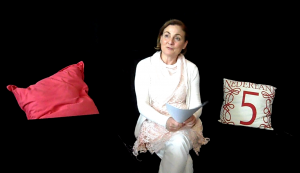
Rita Saliba
What’s the central theme of your work?
Rita: ‘My writings for this visit featured farming, family and my youth, but usually I write other people’s stories, strange situations, relationships, phobias, and most short stories end with a twist. My teen novels deel with sociological problems mainly. I live in the city now, in San Gwann, but I grew up in a small village where every family has a part of land, that can be cultivated. My father was a school teacher but his father had this piece of land. I spent much time with my grandparents, also of my mother’s side. I went to visit the farm and the field. I think after work every family attended their crops they grew for the family, so it was organically grown. Potatoes were on the agenda, everyone grew potatoes and they used to rotate the crop as well. They used to grow wheat and vegetables. I think I learned a lot from that, also about the seasons and the winds. That doesn’t count anymore, the weather has become so inpredictable. But I used to watch my granddad looking at the clouds and saying: ‘We’ve got three days of wind coming.’ People were more sensitive in those days I think. But nowadays in the morning it’s windy and in the evening it can be very hot. We have lots of winds as well, also coming from the Sahara. By the way, in January of this year I also did a poetry workshop with children at Qrendi School on Malta. Hein Jaap Hilarides was there and Jelle Burggraaff and the delegation of Leeuwarden 2018. Most of the relatives of these children grow potatoes, they there were very worried about the weather changes and the lack of rain.’ On June 5th I attended the Potato and Agrarian Festival in Qrendi, where I took part in an art exhibition featuring rural scenery and architecture.’
Leanne: ‘I tend to deal a lot with psychological issues. I wrote a play that deals with cancer, I wrote a novel for young adults about anorexia and I’m writing about self harm now. So there is always the question of who we are, where we come from and where we go to. And also the way that us humans deal with certain issues, that’s always at the back of my mind. It’s an exploration of some of the basic questions in life. I studied Maltese linguistics, I had sociology as well, but psychology always fascinates me, the way people act and think. Through my work I want to ask even more questions.’
What writers are you inspired by?
Rita: ‘I was inspired by foreign writers, like Graham Greene, Anne Fine and also by Maltese writers, mostly men, some women.’ Leanne: ‘There’s a long tradition of male authors in Malta. A lot of women are writing now. Up to a couple of years ago we only knew of Mary Meilak and Doreen Micallef… but then a lot of other female writers started to pave the way, like Maria Grech Ganado. And now I must say it’s quite balanced.’ Rita: ‘I think women were supressed before, I don’t think they got a chance with publishers.’ Leanne: ‘Policy makers were always men. Lately I’ve been engaged by Taiye Selasi’s work. I also love Maraget Atwood’s work. Currently I am reading the works of the authors that will visit this year’s festival.’
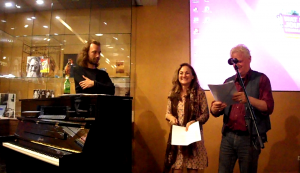
Arjan Hut, Rita Saliba en Loet Hin yn Tresoar
How is your life on Malta?
Rita: ‘I am married and I have grown up children. I have travelled to England because my daughter lives there. My son lives with my husband and me. My work really evolves around the family. I have to find time for myself and for my writing. I do find the time.’ Leanne: ‘I’m not married… yet.’
What’s your impression of Ljouwert and the province?
Rita: ‘It’s really relaxed, it’s green, you can smell the soil. I feel at home here, I don’t know the language of course, but I’m comfortable here.’ Leanne: ‘In Malta we have a lot of high buildings. Buildings are not only spreading but also rising. I felt really at peace here because all the buildings are lower. And there’s a character to this place.’ Rita: ‘When I go back to the village where I grew up it’s a different place now. There’s a lot of traffic, children can’t play outside anymore, everything has changed. I bought bicycles, but actually with all the traffic it’s too dangerous to cycle, so I sold them. But I used to cycle at lot when I was younger at the country side.’
How will the project ‘Poetry in potato bags’ continue?
Leanne: ‘We have the Maltese authors for 2017, who are writing their poetry. And we have some interesting activities going on. We are planning to have illustrations inspired by the writings and we are going to have them printed on tote bags. And we’re also going to visit more schools and publicize the projects there. We are also planning on some visits to farms. We are translating the Frisian and Dutch poetry to Maltese as well. I guess this visit was really really important because it gave us a picture of our collaborators and where they come from and what they do. And also to consolidate this relationship that has started a few years ago. That gives us a perspective to where we’re heading and how we should work towards that. To sit down and to talk to Froukje de Jong, the initiator of the project, and the people of the office of 2018 is very inspiring. I’m really looking forward to collaborating further on this project and hopefully on other projects too. There will be a publication at the end in 2018 that will be the culmination of the project. We will also be showing films from Leeuwarden and hopefully Froukje and Rudi (Wester) from the 2018 office will come back to Malta and will continue the dialogue between us.’
Klik hjir foar Marc Kooij syn filmke fan Rita Saliba.
